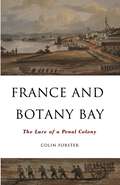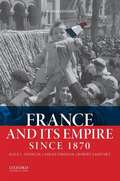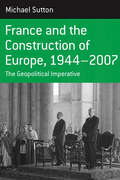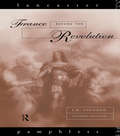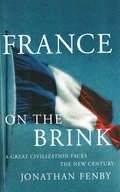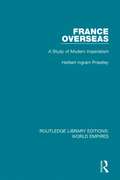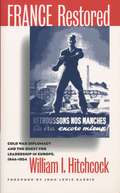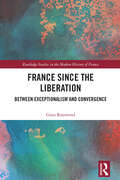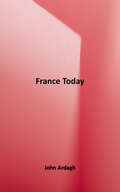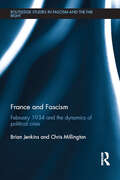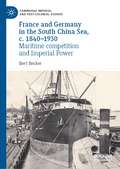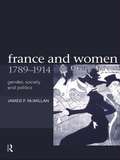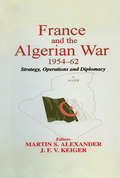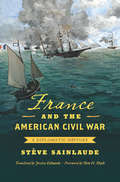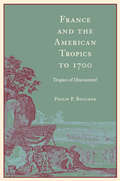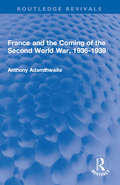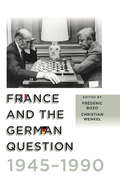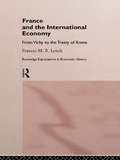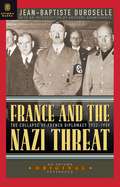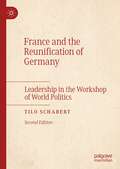- Table View
- List View
France And Botany Bay: The Lure of a Penal Colony
by Colin ForsterConvict transportation to Britain's colonies in Australia greatly influenced political debate and policy in France. Surprisingly, it's a story that has not previously been told. Depiction of Botany Bay as a moral and economic utopia, and the answer to crime, was the basis of vigorous support for the establishment of a French penal colony. Implacably opposed to transportation were those who saw Botany Bay as a penal disaster. The opposing groups amassed a vast array of material. Debate raged. There were floods of impassioned literature. French ships roamed the world in search of an attractive and viable site for their own Botany Bay, and France came close to settling south-west Australia and New Zealand. In the end, the transportationists won. In 1852 France began transportation to French Guiana and in 1863 to New Caledonia. For both settlements, Botany Bay was the model. Colin Forster tells this fascinating story for the first time.
France And Its Empire Since 1870
by Robert Zaretsky Alice Conklin Sarah FishmanProviding an up-to-date synthesis of the history of an extraordinary nation--one that has been shrouded in myths, many of its own making--France and Its Empire Since 1870 seeks both to understand these myths and to uncover the complicated and often contradictory realities that underpin them. It situates modern French history in transnational and global contexts and also integrates the themes of imperialism and immigration into the traditional narrative. Authors Alice L. Conklin, Sarah Fishman, and Robert Zaretsky begin with the premise that while France and the U.S. are sister republics, they also exhibit profound differences that are as compelling as their apparent similarities. The authors frame the book around the contested emergence of the French Republic--a form of government that finally appears to have a permanent status in France--but whose birth pangs were much more protracted than those of the American Republic. Presenting a lively and coherent narrative of the major developments in France's tumultuous history since 1870, the authors organize the chapters around the country's many turning points and confrontations. They also offer detailed analyses of politics, society, and culture, considering the diverse viewpoints of men and women from every background including the working class and the bourgeoisie, immigrants, Catholics, Jews and Muslims, Bretons and Algerians, rebellious youth, and gays and lesbians.
France And The Construction Of Europe, 1944-2007
by Michael SuttonIn the second half of the twentieth century France played the greatest role - even greater than Germany's - in shaping what eventually became the European Union. By the early twenty-first century, however, in a hugely transformed Europe, this era had patently come to an end. This comprehensive history shows how France coupled the pursuit of power and the furtherance of European integration over a sixty-year period, from the close of the Second World War to the hesitation caused by the French electorate's referendum rejection of the European Union's constitutional treaty in 2005.
France Before the Revolution (Lancaster Pamphlets)
by J. H. ShennanThis fully revised second edition takes account of historical work produced during the last decade. Covering the period between Louis XIV's death in 1715 and the outbreak of the French Revolution in 1789, it discusses: * France's accomplishments in international affairs, commercial expansion, and intellectual and artistic life * the significance of long-term political, social and economic forces in causing the Revolution * how the changing perception of government, from one of divine-right kingship towards the idea of a national enterprise, ultimately undermined the old regime.
France Between the Wars: Gender and Politics
by Sian ReynoldsFirst published in 2004. Routledge is an imprint of Taylor & Francis, an informa company.
France On The Brink: A Great Civilization Faces a New Century
by Jonathan FenbyA renowned journalist shows us France as never before seen, and the view will chill and electrify anyone who loves -- or loves to hate -- the country that not only defined culture but gave us the word itself. The traditional leader in the arts, letters, cuisine, and fashion, France embodies universally admired ideals of political expression and personal freedom. But France's heritage, combined with its glorious history, has also created delusions of grandeur -- the Gaullist conviction that France will always be an "exception". France today is in crisis. High unemployment, an archaic economic system, a self-selecting governing class unable to handle serious problems, and a debilitating nostalgia for things past are dragging it closer to the brink at the very moment of European unification. Urgent, convincing, and unsparing, this eye-opening look at the world's most complex, seductive, and sometimes infuriating country will give even the most knowledgeable Francophile plenty to think about.
France Overseas: A Study of Modern Imperialism (Routledge Library Editions: World Empires #13)
by Herbert Ingram PriestleyOriginally published in 1938. Upon restoration of peace in 1814, recovery of colonial prestige become one of the leading affairs of the French state. First the Old Colonies were reoccupied, then new areas were sought in the Pacific, Asia, and in Africa. This book examines the growth of France overseas in the nineteenth century.
France Restored: Cold War Diplomacy and the Quest for Leadership in Europe, 1944-1954
by William I. HitchcockHistorians of the Cold War, argues William Hitchcock, have toooften overlooked the part that European nations played in shapingthe post-World War II international system. In particular,France, a country beset by economic difficulties and politicalinstability in the aftermath of the war, has been given shortshrift. With this book, Hitchcock restores France to the narrativeof Cold War history and illuminates its central role in thereconstruction of Europe. Drawing on a wide array of evidencefrom French, American, and British archives, he shows that Franceconstructed a coherent national strategy for domestic andinternational recovery and pursued that strategy with tenacityand effectiveness in the first postwar decade. This once-occupiednation played a vital part in the occupation and administrationof Germany, framed the key institutions of the "new" Europe,helped forge the NATO alliance, and engineered an astonishingeconomic recovery. In the process, France successfully contestedAmerican leadership in Europe and used its position as a key ColdWar ally to extract concessions from Washington on a wide rangeof economic and security issues.
France Since the Liberation: Between Exceptionalism and Convergence (Routledge Studies in the Modern History of France)
by Gino RaymondThis book focuses on the tension between the modernising thrust that places France on a trajectory of convergence with comparable liberal democracies and the defence of a national specificity that can act as a brake, complicating France’s relationship with its neighbours, its present and its past. This ambivalence in French political and social life stems from the conscious attempt to rebuild the nation after the trauma of Occupation during World War II and the new beginning provided by the Liberation. The government of the Fourth Republic embraced the pursuit of a modernisation that would enable it to regain its place among the world’s leading democratic states. However, this modernising ambition co-exists with the belief in a specific destiny and a unique sense of mission that are intrinsic to the emergence of a sense of nationhood after the revolution of 1789. Raymond defines a critical perspective that draws together historical, economic, social, and political issues into a coherent understanding of what makes France the way it is today. Written with both academic rigour and a highly accessible clarity of style, this volume is a valuable resource for students, educators, and researchers in French and European Studies.
France Today
by John ArdaghThis is a new edition of John Ardagh's study of modern France which examines the profound changes in French society since World War II.
France and 1848: The End of Monarchy
by William FortescueAn extensive and authoritative study that examines the economic, social and political crises of France during the revolution of 1848. Using analysis of original sources and recent research, Fortescue here offers new interpretations of events leading up to and after the second republic was declared.Looking at Louis Philippe's overthrow, the proclamation of manhood suffrage and the unexpected success of the right-wing in the subsequent elections, this book evaluates the political history of France in 1848 and the French political culture of the time.This should be read by all students of nineteenth century history, political scientists and all those with an interest in the historical development of French political culture.
France and Britain, 1900-1940: Entente and Estrangement
by P. M. BellThe first of a two volume study, which will analyse the complex relationship between Britain and France in the twentieth century: a relationship which has been crucial to European politics and to both World Wars.This volume (fully self-contained) runs from the period of intense imperial rivalry at the turn of the century to the Fall of France. Philip Bell discusses diplomatic, economic and military policy, combining absorbing narrative with revealing commentary about the two countries.
France and Britain, 1940-1994: The Long Separation
by P. M. BellThis is the second volume in Philip Bell's study of Franco-British relations in the twentieth century It covers the period from the Fall of France in 1940 to the opening of the Channel Tunnel. Philip Bell views the half-century as a long separation - with France committed early on to a new concept of Europe, in partnership with Germany, whilst Britain stood apart. The tensions and resentments it has generated have kept French/British relations at the very heart of the burning question of Britain's place in Europe. Yet the story has another side, to which Philip Bell also does justice. Much has been achieved by the two countries together and alongside their European partners. For all their divergencies and antagonisms, the French and British know and understand each other better today than at any other time in their modern histories and all these developments are fully explored in Philip Bell's engrossing and often amusing, account.
France and Fascism: February 1934 and the Dynamics of Political Crisis (Routledge Studies in Fascism and the Far Right)
by Brian Jenkins Chris MillingtonFrance and Fascism: February 1934 and the Dynamics of Political Crisis is the first English-language book to examine the most significant political event in interwar France: the Paris riots of February 1934. On 6 February 1934, thousands of fascist rioters almost succeeded in bringing down the French democratic regime. The violence prompted the polarisation of French politics as hundreds of thousands of French citizens joined extreme right-wing paramilitary leagues or the left-wing Popular Front coalition. This ‘French civil war’, the first shots of which were fired in February 1934, would come to an end only at the Liberation of France ten years later. The book challenges the assumption that the riots did not pose a serious threat to French democracy by providing a more balanced historical contextualisation of the events. Each chapter follows a distinctive analytical framework, incorporating the latest research in the field on French interwar politics as well as important new investigations into political violence and the dynamics of political crisis. With a direct focus on the actual processes of the unfolding political crisis and the dynamics of the riots themselves, France and Fascism offers a comprehensive analysis which will be of interest to undergraduate and postgraduate students, as well as scholars, in the areas of French history and politics, and fascism and the far right.
France and Germany in the South China Sea, c. 1840-1930: Maritime competition and Imperial Power (Cambridge Imperial and Post-Colonial Studies)
by Bert BeckerThis book explores imperial power and the transnational encounters of shipowners and merchants in the South China Sea from 1840 to 1930. With British Hong Kong and French Indochina on its northern and western shores, the ‘Asian Mediterranean’ was for almost a century a crucible of power and an axis of economic struggle for coastal shipping companies from various nations. Merchant steamers shipped cargoes and passengers between ports of the region. Hong Kong, the global port city, and the colonial ports of Saigon and Haiphong developed into major hubs for the flow of goods and people, while Guangzhouwan survived as an almost forgotten outpost of Indochina. While previous research in this field has largely remained within the confines of colonial history, this book uses the examples of French and German companies operating in the South China Sea to demonstrate the extent to which transnational actors and business networks interacted with imperial power and the process of globalisation.
France and Women, 1789-1914: Gender, Society and Politics
by James McMillan Professor James McmillanFrance and Women, 1789-1914 is the first book to offer an authoritative account of women's history throughout the nineteenth century. James McMillan, author of the seminal work Housewife or Harlot, offers a major reinterpretation of the French past in relation to gender throughout these tumultuous decades of revolution and war.This book provides a challenging discussion of the factors which made French political culture so profoundly sexist and in particular, it shows that many of the myths about progress and emancipation associated with modernisation and the coming of mass politics do not stand up to close scrutiny. It also reveals the conservative nature of the republican left and of the ingrained belief throughout french society that women should remain within the domestic sphere. James McMillan considers the role played by French men and women in the politics, culture and society of their country throughout the 1800s.
France and the Algerian War, 1954-1962: Strategy, Operations and Diplomacy
by Martin S. Alexander J. F. V. KeigerThe French Army's war in Algeria has always aroused passions. This book does not whitewash the atrocities committed by both sides; rather it focuses on the conflict itself, a perspective assisted by the French republic's official admission in 1999 that what happened in Algeria was indeed a war.
France and the American Civil War: A Diplomatic History (Civil War America)
by Stève SainlaudeFrance's involvement in the American Civil War was critical to its unfolding, but the details of the European power's role remain little understood. Here, Steve Sainlaude offers the first comprehensive history of French diplomatic engagement with the Union and the Confederate States of America during the conflict. Drawing on archival sources that have been neglected by scholars up to this point, Sainlaude overturns many commonly held assumptions about French relations with the Union and the Confederacy. As Sainlaude demonstrates, no major European power had a deeper stake in the outcome of the conflict than France.Reaching beyond the standard narratives of this history, Sainlaude delves deeply into questions of geopolitical strategy and diplomacy during this critical period in world affairs. The resulting study will help shift the way Americans look at the Civil War and extend their understanding of the conflict in global context.
France and the American Tropics to 1700: Tropics of Discontent?
by Philip P. BoucherTraditionally, the story of the Greater Caribbean has been dominated by the narrative of Iberian hegemony, British colonization, the plantation regime, and the Haitian Revolution of the eighteenth century. Relatively little is known about the society and culture of this region—and particularly France's role in them—in the two centuries prior to the rise of the plantation complex of the eighteenth century. Here, historian Philip P. Boucher offers the first comprehensive account of colonization and French society in the Caribbean. Boucher's analysis contrasts the structure and character of the French colonies with that of other colonial empires. Describing the geography, topography, climate, and flora and fauna of the region, Boucher recreates the tropical environment in which colonists and indigenous peoples interacted. He then examines the lives and activities of the region's inhabitants—the indigenous Island Caribs, landowning settlers, indentured servants, African slaves, and people of mixed blood, the gens de couleur. He argues that the sixteenth and seventeenth centuries were not merely a prelude to the classic plantation regime model. Rather, they were an era presenting a variety of possible outcomes. This original narrative demonstrates that the transition to sugar and the plantation complex was more gradual in the French properties than generally depicted—and that it was not inevitable.
France and the American Tropics to 1700: Tropics of Discontent?
by Philip P. Boucher“An important addition to the literature on Caribbean history and colonial societies in the 17th century.” —ChoiceTraditionally, the story of the Greater Caribbean has been dominated by the narrative of Iberian hegemony, British colonization, the plantation regime, and the Haitian Revolution of the eighteenth century. Relatively little is known about the society and culture of this region—and particularly France’s role in them—in the two centuries prior to the rise of the plantation complex of the eighteenth century. Here, historian Philip P. Boucher offers the first comprehensive account of colonization and French society in the Caribbean.Boucher’s analysis contrasts the structure and character of the French colonies with that of other colonial empires. Describing the geography, topography, climate, and flora and fauna of the region, Boucher recreates the tropical environment in which colonists and indigenous peoples interacted. He then examines the lives and activities of the region’s inhabitants—the indigenous Island Caribs, landowning settlers, indentured servants, African slaves, and people of mixed blood, the gens de couleur. He argues that the sixteenth and seventeenth centuries were not merely a prelude to the classic plantation regime model. Rather, they were an era presenting a variety of possible outcomes. This original narrative demonstrates that the transition to sugar and the plantation complex was more gradual in the French properties than generally depicted—and that it was not inevitable.
France and the Coming of the Second World War, 1936-1939 (Routledge Revivals)
by Anthony AdamthwaiteFirst published in 1977, France and the Coming of the Second World War investigates the policies that led to the collapse of French power. The book argues that this collapse was the result of social, political, and economic troubles that buffeted French leaders. It uses a wealth of documents to explore common debates, such as Britain’s culpability for France’s inability to prevent Germany’s reoccupation of the Rhineland. It also puts forward the threat of Italy and the Mediterranean as France’s main preoccupation, rather than Germany and central Europe. France and the Coming of the Second World War uses an extensive range of archival material and includes the private papers of Daladier, Bonnet, and a number of other prominent figures. It will appeal to those with an interest in the history of the Second World War, political history, and social history.
France and the German Question, 1945–1990
by Frédéric Bozo Christian WenkelIn the immediate aftermath of World War Two, the victors were unable to agree on Germany’s fate, and the separation of the country—the result of the nascent Cold War—emerged as a de facto, if provisional, settlement. Yet East and West Germany would exist apart for half a century, making the "German question" a central foreign policy issue—and given the war-torn history between the two countries, this was felt no more keenly than in France. Drawing on the most recent historiography and previously untapped archival sources, this volume shows how France’s approach to the German question was, for the duration of the Cold War, both more constructive and consequential than has been previously acknowledged.
France and the International Economy: From Vichy to the Treaty of Rome (Routledge Explorations in Economic History)
by Frances LynchThis is a comprehensive history of a critically formative period in French economic history. Frances Lynch covers topics such as the post-war negotiations for American aid, the reconstruction of a capital market, the modernization of French agriculture, the liberalization of trade in the 1950s and subsequent economic growth.
France and the Nazi Threat
by Jean-Baptiste DuroselleA brilliant study by France's foremost historian of the period that details the reasons behind France's lack of response to Hitler's Germany during the 1930s and the slide toward war.
France and the Reunification of Germany: Leadership in the Workshop of World Politics
by Tilo SchabertWith the collapse of the Soviet Union and its Eastern European bloc, the reunification of Germany was a major episode in the history of modern Europe — and one widely held to have been opposed by that country's centuries-old enemy, France. But while it has been previously believed that French President François Mitterrand played a negative role in events leading up to reunification, this book shows that Mitterrand's main concern was not the potential threat of an old nemesis but rather that a reunified Germany be firmly anchored in a unified Europe. Updated with a new introduction and other materials, the book blends primary research and interviews with key actors in France and Germany to take readers behind the scenes of world governments as a new Europe was formed. Tilo Schabert had unprecedented, exclusive access to French presidential archives and here focuses on French diplomacy not only to dispel the notion that Mitterrand was reluctant to accept reunification but also to show how successful he was in bringing it about.
